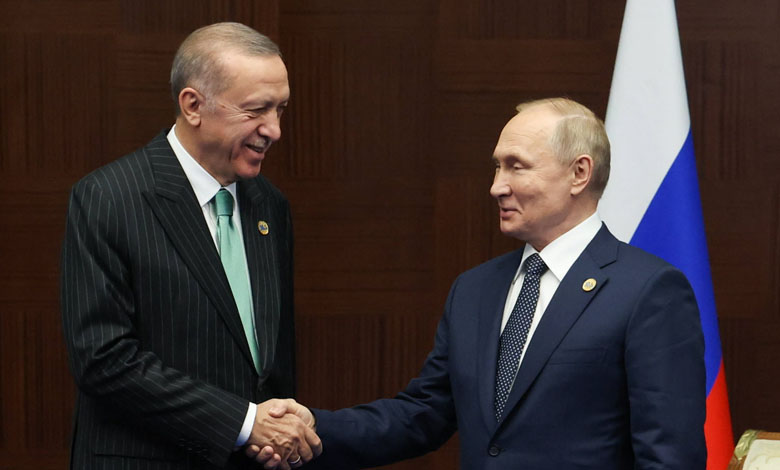Turkey starts implementing Putin’s plan to establish a gas hub

Turkey is using the growing differences between Russia and the West to serve its own interests, especially in the field of energy and gas supplies, as Ankara has shown rapprochement with Moscow in this regard.
Turkish news channel NTV and other channels reported on Friday that President Recep Tayyip Erdogan ordered the Minister of Energy to work on building a gas center in Turkey following talks with Russian President Vladimir Putin on the matter.
News channels quoted Erdogan as saying that the two countries would immediately begin work on Putin’s proposal to transport Russian gas to Europe and that there would be “no waiting”.
The Russian president described Turkey on Thursday as the best way to redirect gas supplies to the European Union after the leaks in the Nord Stream pipeline.
The Turkish President suggested that the north-western region of Thrace would be more suitable for Putin’s proposal to establish an international gas distribution center.
Speaking to reporters on his return flight from the Kazakh capital of Astana after participating in the Conference on Interaction and Confidence-Building Measures in Asia (CICA), Erdogan said. “We will build a gas center in Turkey in the most suitable place, God willing. We have a national distribution center, but the new one will be international.”
Erdogan has been seeking to put pressure on the West and Europe over the continuing crisis, blaming Western pressure on Russia for the continuing energy crisis and its repercussions on the region.
This stance largely mirrors Moscow’s position, with Russian officials blaming “sanctions” for the halt in Russian gas shipments to Germany via Nord Stream.
Erdogan is well placed to play the crisis, maintaining good relations with Russian President Vladimir Putin while trying to remain neutral in the conflict and supplying Ukraine with Turkish-made weapons and combat marches.
Despite the negative repercussions of the rise in world energy prices on the Turkish economy as a result of the disruption of Russian supplies, where the annual rate of inflation reached 80% while the value of the lira collapsed, Turkey is seeking benefits from the crisis, which explains the recent agreement with Putin.
Russia contributed nearly half of Turkey’s natural gas purchases last year. “Ankara pledged to move slowly to pay for Russian imports with rubles at a summit between Erdogan and Putin in Sochi last month.”
Europe is facing its worst gas-supply crisis ever, with energy prices rising to such an extent that German importers are discussing the possibility of rationing consumption in the EU’s largest economy after Russia reduced gas flows westward.
France is also in the throes of a crisis, with media outlets reporting queues of drivers waiting in line to get fuel, while authorities have decided to rely on nuclear reactors that need maintenance to ease the country’s energy crisis.
The United States and the European Union accuse Russia of energy extortion after Moscow reduced gas supplies to European customers. Russia said there were technical problems at a pressure station that the sanctions prevented from reforming.
The Kremlin says the West caused the energy crisis by imposing the most severe sanctions in modern history, a move President Vladimir Putin says resembles a declaration of economic war.












